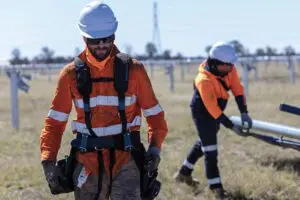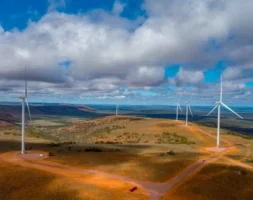Australian shareholders on Wednesday delivered a stunning statement to the Australian energy industry, when nearly half voted in support of a motion at the Origin Energy annual general meeting demanding the utility report on whether lobbying groups it supports are obstructing action on climate change.
The resolution at the Origin AGM was supported by 46 per cent of votes, which analysts and campaigners said was a remarkable result given the first-time nature of the resolution, and the biggest ever protest vote not supported by a company board.
The company had earlier sought to defuse the issue by promising that in future documents it would improve the disclosure of its industry association memberships, including how it defines its public advocacy.
One of the most contentious memberships is that of the Business Council of Australia, chaired by former Origin CEO Grant King, which has sought to demonise any move beyond 28 per cent renewable energy as “reckless”, and has described Labor’s 45 per cent emissions reduction target by 2030 as an “economy killer” – even though it is in line with the IPCC report.
The BCA, along with other industry groups, has played a critical role in undermining Australia’s carbon price, and cutting Australia’s renewable energy target and fighting against other measures.
 The Origin Energy vote was welcomed by advocates, including Tom Swann from The Australia Institute, and Emma Herd, the head of the Investor Group on Climate Change, a group that unites institutional investors with more than $2 trillion of assets.
The Origin Energy vote was welcomed by advocates, including Tom Swann from The Australia Institute, and Emma Herd, the head of the Investor Group on Climate Change, a group that unites institutional investors with more than $2 trillion of assets.
“It’s clear that investors have lost patience (with) climate policy obstruction,” Herd wrote on her twitter account. Richard Merzian, the head of the climate and energy program at The Australia Institute described the vote against the “terrible climate advocacy” of groups such as BCA as an “amazing outcome.”
It was also hailed as an historic vote by Brynne O’Brien, the head of the Australasian Centre for Corporate Responsibility, which proposed the motion.
“The 46 per cent vote on climate lobbying is the largest vote for any shareholder proposal (without Board support) in Australian corporate history and a clear rebuke to the carbon lobby,” it wrote.
The ACCR also criticises Origin’s membership of the Australian Petroleum Production and Exploration Association (APPEA), and the Queensland Resources Council, both of which have appointed former energy ministers Martin Ferguson and Ian Macfarlane to senior roles.
“Investors clearly understand that such advocacy puts their long-term portfolios at risk, and this vote is a message to all ASX-listed companies, that the days of obstruction are over,” the ACCR said.
The ACCR has also campaigned against company members of the Minerals Council of Australia, the most potent lobbying group against climate action and renewables, and which advocates for coal and nuclear.
Of the big four utilities, only EnergyAustralia is a member of Minerals Council, according to its website, although senior executives from the Minerals Council now act as chief of staff for prime minister Scott Morrison, as well as having senior roles in trade minister Steve Ciobo’s office, and were policy advisors in former PM Malcolm Turnbull’s office.
Origin, as it turns out, is arguably one of the most engaged of the big utilities in emissions reduction and energy transformation. It has vowed to exit coal by 2032, when it plans to close its one coal-fired generator, the Eraring facility in NSW.
It also has targets of reaching zero emissions before 2050, in line with the IPCC report recommendations last week, but its commitment to cut emissions by 50 per cent is predicated on the closure of Eraring.
Another motion at the AGM sought to condemn the company for effectively allowing itself to increase emissions until then. That vote attracted support of 11.83 per cent.
In the last financial year, Origin increased emissions by 5 per cent, mostly because of a 14 per cent lift in output from Eraring, which it said was making up for the closures of the Hazelwood power generator in Victoria, and the Northern generator on South Australia.
The emissions intensity from Eraring was also higher than previously, at 0.92 tonnes of CO2-e per MWh from 0.90 tonnes of CO2-e per MWh in FY2017, because of a change in coal supply during a period of planned maintenance at one of the company’s “higher-quality” coal suppliers.
“While we do not like our emissions to rise, we believe that increasing supply and putting downward pressure on wholesale prices was in the best interests of customers,” the company said in its sustainability report.
“We maintain our ongoing commitment to decarbonisation, including driving the substitution of higher carbon intensive fuels for lower-carbon fuels, such as renewables and natural gas.”
Origin estimates its gas generation fleet emissions intensity was 0.51 tonnes of CO2-e per MWh in FY2018, while its contracted renewables “provide negligible emissions intensity.”
Origin currently sources 13 per cent of its generation mix, but says contracts with capacity currently under development, such as the nearly complete Daydream and Bungala solar farms, and the Stockyard Hill wind farm, will lift that to more than 25 per cent by 2020.
The ACCR also pushed a motion against Origin Energy’s proposed fracking activities in the Northern Territory. The vote gathered the support of 7.73 per cent of votes, and 2.1 per cent abstained.
This is a momentous occasion,” O’Brien said in a statement. “This is the first shareholder resolution of its kind ever voted upon in Australia, and perhaps the world.
“Traditional Owners have traveled from remote parts of Australia to speak to their concerns, and to stand up for their rights and their communities.
“10% of investors have voted against the Board’s advice. This is a solid base from which to build, but represents the challenge that lies ahead in working with the Australian investment community to increase their understanding of the human rights impacts of business.”










